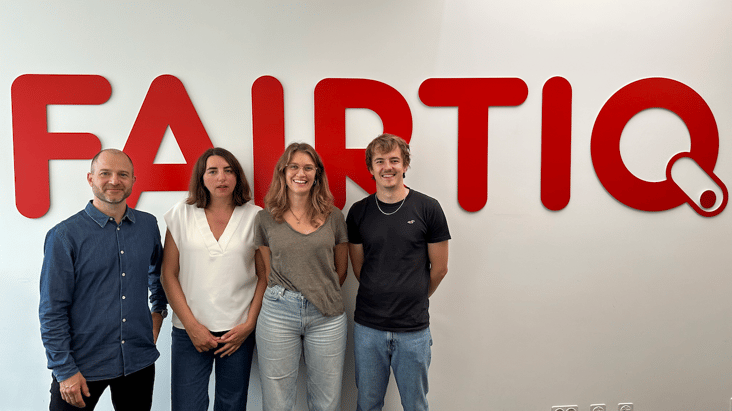Bern, 03.10.2023. "Always the same! Or always different?" How sales and ticketing in public transport develop in different regions of Europe was the theme of the FAIRTIQ Forum 2023. The online conference on September 14 brought together leading experts from the transport industry to discuss approaches and trends in the ever-changing ticket sales landscape in public transport.
Check-in/check-out ticketing in public transport is establishing itself as a new and dynamically growing sales channel in many regions and countries in Europe - with increasing usage figures. More than 120 million public transport journeys have already been processed via FAIRTIQ's app-based ticketing solutions, reported Gian-Mattia Schucan, founder and co-CEO, at the start of this year's FAIRTIQ Forum. The conference also highlighted other approaches such as flat-rate tickets and obility management in companies.
At the online conference, representatives of public transport companies and transport associations from Germany, Austria, Switzerland, Liechtenstein, France and other European countries discussed the various approaches and technologies that simplify sales and ticketing in European public transport. Speakers, panelists and participants of the forum agreed that modal shift to sustainable mobility succeeds when public transport travel becomes "radically simple".
"Digital technological innovations for sustainable and connected mobility are the key to the transport turnaround," said keynote speaker Olga Nevska at the start of the conference. The Managing Director of Telekom MobilitySolutions shared her experience of transforming one of Germany's largest corporate fleets into an innovative mobility provider. Demand-driven and shared mobility services would only have a high social impact if they were easily accessible and affordable, and if they ensured secure data handling. Transport providers need to consider mobility as a holistic ecosystem, with public transport as a crucial partner. "No one can do it alone," Olga Nevska explained.
The best way to attract more passengers to public transport and increase the share of public transport in the modal split is “radical simplicity”, said the second keynote speaker Andreas Fuhrer from Alliance SwissPass. The Swiss public transport industry organization is currently developing and testing new forms of ticketing and pricing in the myRIDE project. With the post-pricing approach, only the distances actually traveled are charged. This makes it possible to optimize or, for example, cap travel costs based on usage behavior. "With this, we are not replacing anything, but creating a new, digital, customer-oriented and barrier-free accessible alternative to existing classic offers," Andreas Fuhrer clarified.
An example from the French region of Occitanie showed how flexible fares can make public transport more attractive. Based on the principle of a loyalty programme - the more you travel, the cheaper individual journeys become to the point of being free - the transport provider first developed a tariff model especially for young adults. "We have since successfully developed this offer for other age groups," said Valérie Ossant, Ticketing Distribution Pricing Project Manager of liO Train in the Occitanie region. "We were able to win 75,000 new customers with this and achieve 1.8 million more journeys," reported Daniel Aubaret, Head of Marketing at SNCF Voyageurs Occitanie.
The potential offered by low-cost flat rate models was discussed using the example of the Klimaticket in Austria. With up to 10,000 new customers per month and over 90 percent renewals for another year, the offer is well received, reported Jakob Lambert, Managing Director of One Mobility. An important effect is the high integration effect that such models have on the public transport sector as a whole. This is also shown by the example of Switzerland as well as the Deutschlandticket in Germany. "You have to get your act together," says Lambert. “Whether such solutions can establish themselves in the long term is ultimately a question of setting the political course”, said Gian-Mattia Schucan, founder and co-CEO of FAIRTIQ.
Flat rates could make a considerable difference in the short term. "In the long term, however, creativity is needed to simply try out and test new ideas in order to tap into unused customer potential, and also to secure the financing of public transport in the long term." Check-in/check-out solutions could ensure continued gains for public transport in the modal split in a tariff landscape between a flat rate offer for frequent travellers and economy tickets for occasional customers.
Other topics of the online conference were data monitoring, quality control and abuse (Fraud) prevention in automatic (PAYG) journey recording. Susanne Hirschi and Bruno Lehmann from Alliance SwissPass presented approaches to correct data capture and price calculation. "The FAIRTIQ technology already works very well here," said Lehmann. Work is also being done on the enhancement of the distribution of the revenues generated via automatic (PAYG) ticketing. One approach to this is to utilise beacons on buses and trains to record routes precisely for each vehicle in order to improve the accuracy of the allocation of journeys to the respective transport company - for example, when two different providers travel on the same route at the same time. Nico Misselwitz, Head of FM&RE (Property Management and Real Estate) - Digital Customer Experience & Mobility at the Swiss pharmaceutical company Roche, showed which development opportunities for sustainable mobility B2B partnerships bring.
About FAIRTIQ
FAIRTIQ is an innovative Swiss company, which aims to make it as easy as possible to travel by public transport. The free ticketing app and technology, developed and operated by FAIRTIQ and accredited according to strict quality criteria, can already be used across the entire public transport system in Switzerland and Liechtenstein, as well as in parts of Germany, Austria and France. Over 140 employees are involved in the operation and ongoing development of the product. FAIRTIQ was founded by Gian-Mattia Schucan in 2016 and is a private limited company with headquarters in Bern.
With over 123 million journeys in total, FAIRTIQ is the world’s most successful check-in/check-out solution available for iPhone and Android. FAIRTIQ’s partners include public transport companies and associations in Switzerland, Germany, Austria, Liechtenstein and France. Swiss Federal Railways (SBB) uses the technology operated by FAIRTIQ in its own app, EasyRide, and Austrian Federal Railways (ÖBB) also uses FAIRTIQ technology in its app.
Travelling with FAIRTIQ
Before boarding a train, tram or bus, passengers check in by swiping the app. This means they have a valid ticket for the entire public transport network in the corresponding region. When they arrive at their destination, they swipe again to end the cost calculation. The app uses location services to register the route travelled and calculates the correct fare.






Share